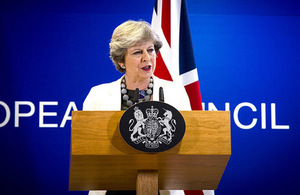Theresa May – 2021 Speech on Foreign Aid Cuts
The speech made by Theresa May, the former Prime Minister, in the House of Commons on 13 July 2021.
I thank you, Mr Speaker, and the Government for enabling this debate today.
I stood on a manifesto commitment to maintain international aid funding at 0.7% of gross national income—and not just that, because we said:
“We will proudly maintain our commitment to spend 0.7 per cent of GNI on development”.
Early last year, the pandemic hit. It had an immediate negative effect on the economy, yet in September 2020, when that effect on the economy had been seen, when public spending was increasing and when the Government were already borrowing hundreds of billions of pounds, they confirmed in their response to the fourth report of the International Development Committee that they would honour that manifesto commitment, saying:
“a commitment enshrined in law and one to which the new Department”—
the Foreign, Commonwealth and Development Office—
“will honour its responsibilities.”
The Government went on to say that investing that 0.7% was at the heart of the vision of the Government’s integrated review for the UK
“as an active, internationalist, problem-solving and burden-sharing nation.”
Where is that vision now, as the Government turn their back on some of the poorest in the world?
With GNI falling, our funding for aid was falling in any case. To reduce it from 0.7% to 0.5% is a double blow. This is not about palaces for dictators and vanity projects; it is about what cuts to funding mean: fewer girls will be educated, more girls and boys will become slaves, more children will go hungry and more of the poorest people in the world will die.
The Government have promised what they see as a compromise, and I am grateful to the Chancellor for speaking to me last night. I asked how long it would take before the tests are met and we return to 0.7%. I was told, “Four to five years, but it could be sooner, because the economy is recovering so well.” If the motion is defeated tonight, it will be 0.7% from January next year. The Government appear to be saying to us, “We cannot afford 0.7% next year because the economy is doing so badly, but actually the economy is doing so well that we could very well be able to restore 0.7% very soon”. The Government cannot have it both ways.
I certainly doubt whether the tests will ever be met in five years’ time. Meeting them depends not only on a significant recovery in the economy—the Office for Budget Responsibility is forecasting trend growth of less than 2%—but on the Government reining in their inclination to continue to increase public spending. We are told that there will be dire consequences for tax and public spending if this motion is defeated. We have borrowed £400 billion—where are the dire warnings about that? It seems that £4 billion is really bad news; £400 billion—who cares?
Finally, as has been pointed out, the two tests have only been met in one calendar year in the past 20 years. I have been in this House for nearly a quarter of a century. During that time, I have never voted against a three-line Whip from my party. As Prime Minister, I suffered at the hands of rebels. I know what it is like to see party colleagues voting against their Government. We made a promise to the poorest people in the world. The Government have broken that promise. This motion means that promise may be broken for years to come. With deep regret, I will vote against the motion today.

